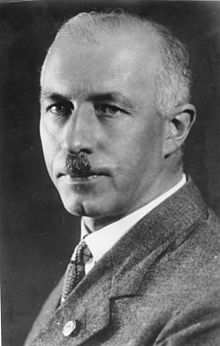Gottfried Feder
| Gottfried Feder | |
|---|---|
 |
|
| Born |
27 January 1883 Würzburg, Bavaria, German Empire |
| Died | 24 September 1941 (aged 58) Murnau am Staffelsee, Germany |
| Nationality | German |
| Institution | Berlin Institute of Technology |
| Field | Urbanism |
| School or tradition |
National Socialism |
| Alma mater | Humboldt University of Berlin |
| Influenced | Adolf Hitler, Uzō Nishiyama |
| Contributions | National Socialism Strasserism Anti-capitalism Planned community |
Gottfried Feder (27 January 1883 – 24 September 1941) was a German civil engineer, self-taught economist and one of the early key members of the Nazi Party. He was their economic theoretician. Initially, it was his lecture in 1919 that drew Hitler into the party.
Feder was born in Würzburg, Germany on 27 January 1883 as the son of civil servant Hanse Feder and Mathilde Feder (née Luz). After attending humanistic schools in Ansbach and Munich, he studied engineering in Berlin and Zürich (Switzerland); after graduating, he founded a construction company in 1908 that subsequently was particularly active in Bulgaria where it built a number of official buildings.
From 1917 on, Feder studied financial politics and economics on his own; he developed a hostility towards wealthy bankers during World War I and wrote a "manifesto on breaking the shackles of interest" ("Brechung der Zinsknechtschaft") in 1919. This was soon followed by the founding of a "task force" dedicated to those goals that demanded a nationalisation of all banks and an abolition of interest.
In the same year, Feder, together with Anton Drexler, Dietrich Eckart and Karl Harrer, was involved in the founding of the Deutsche Arbeiterpartei (German Workers' Party-DAP).Adolf Hitler met him in summer 1919 while he was in an anti-Bolshevik training course at Munich university—funded by the army and organized by Major Karl Mayr—and Feder became his mentor in finance and economics. He was the inspirer of Hitler's opposition to "Jewish finance capitalism." Delivering political courses alongside Feder was Karl Alexander von Müller (son of Bavaria's Culture Minister) who spotted Hitler's oratorical ability and forwarded his name as a political instructor for the army—an important step in Hitler's career.
...
Wikipedia
